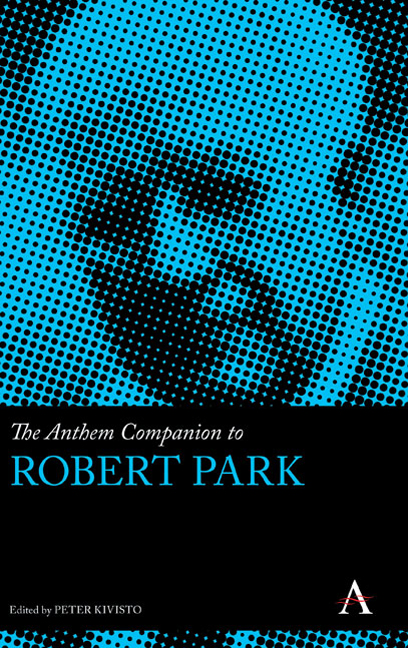Book contents
- Frontmatter
- Contents
- Introduction: The Legacy of Robert Ezra Park
- Chapter 1 A Twisted Path: Park, Gender and Praxis
- Chapter 2 Robert Park's Journey into Sociology
- Chapter 3 Beyond “Get the Seat of Your Pants Dirty in Real Research”: Park on Methods
- Chapter 4 The Basic Components of Social Action: Mead versus Park
- Chapter 5 Robert E. Park: Neglected Social Psychologist
- Chapter 6 Robert E. Park's Theory of Assimilation and Beyond
- Chapter 7 Robert Park's Marginal Man: The Career of a Concept in American Sociology
- Chapter 8 Marginality, Racial Politics and the Sociology of Knowledge: Robert Park and Critical Race Theory
- Chapter 9 The Cities of Robert Ezra Park: Toward a Periodization of His Conception of the Metropolis (1915–39)
- Chapter 10 The Impact of Robert E. Park on American Sociology of Religion
- Chronology
- Contributors
- Index
Chapter 9 - The Cities of Robert Ezra Park: Toward a Periodization of His Conception of the Metropolis (1915–39)
Published online by Cambridge University Press: 10 January 2018
- Frontmatter
- Contents
- Introduction: The Legacy of Robert Ezra Park
- Chapter 1 A Twisted Path: Park, Gender and Praxis
- Chapter 2 Robert Park's Journey into Sociology
- Chapter 3 Beyond “Get the Seat of Your Pants Dirty in Real Research”: Park on Methods
- Chapter 4 The Basic Components of Social Action: Mead versus Park
- Chapter 5 Robert E. Park: Neglected Social Psychologist
- Chapter 6 Robert E. Park's Theory of Assimilation and Beyond
- Chapter 7 Robert Park's Marginal Man: The Career of a Concept in American Sociology
- Chapter 8 Marginality, Racial Politics and the Sociology of Knowledge: Robert Park and Critical Race Theory
- Chapter 9 The Cities of Robert Ezra Park: Toward a Periodization of His Conception of the Metropolis (1915–39)
- Chapter 10 The Impact of Robert E. Park on American Sociology of Religion
- Chronology
- Contributors
- Index
Summary
Robert Ezra Park is often presented as the founding father of urban sociology in the United States. Appointed professor of sociology at the University of Chicago in 1915, he later served as the inspiration for numerous empirical studies undertaken in the heart of Illinois's major city, which were quickly taken to be the expression of a “school of urban sociology” articulated according to a certain understanding of the urban phenomenon. If it is undeniable that that these undertakings, whose publication covers the years between 1915 and 1940, with a particularly high concentration between 1925 and 1930, are part of an undeniably coherent research agenda, it is nevertheless also true that certain inflections appear upon closer examination. In this chapter, I shall defend the following thesis: three periods, characterized by correspondingly different understandings of the city, emerged in sequence between 1915 – the year Park published The City: Suggestion for the Investigation of Human Behavior in the City Environment – and 1939, when he produced his final work on the metropolis, The City as Natural Phenomenon. Three main concepts were chosen in order to capture the spirit of each period as well as Park's evolving understanding of the city. The first conception, the city as institution, finds its principal expression in the 1915 article, The City; the second, the city as natural community, begins to appear in 1921 in the pages of the voluminous Introduction and would form the central axis of publications by Park, his colleagues, and his students until the 1930s; and finally the third conception, the city as super- organism, takes shape at the same time but is only explicitly articulated in 1936, to remain in use through Park's final texts.
In order to understand the transformations in the vision of the city as developed by Park, the history of ideas is not in itself sufficient. To pursue such an approach would effectively be to embrace the assumption that the intellectual evolution of a body of work always results from a purely logical sequence, or that – which would amount to the same thing – its final incarnation represents the teleological conclusion of a strictly autonomous reflection.
- Type
- Chapter
- Information
- The Anthem Companion to Robert Park , pp. 201 - 224Publisher: Anthem PressPrint publication year: 2017



